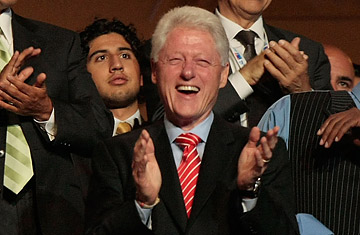
Former U.S. President Bill Clinton claps during day two of the Democratic National Convention.
My fellow Americans: I told you so!
Bill Clinton probably won't put it quite that bluntly at the Democratic National Convention tonight. But he probably will use his speech to remind Americans that things were pretty good during the Clinton administration, despite a lot of dire warnings from Republicans, and that things are considerably less good now. He'll probably mention George W. Bush's efforts to reverse just about everything he did, and suggest they might have had something to do with our national journey from peace, prosperity and record budget surpluses to a quagmire in Iraq, recession in America and record budget deficits.
It's a strong argument for Democrats, and nobody makes it better than Bill Clinton. But if he really wants to help Barack Obama reach the White House — a proposition that is at best unclear — he'll provide more than a rousing defense of Clintonism and its 22 million new jobs. Democrats had their chance to extend Clintonism; they didn't.
Assuming we're in for at least some legacy-polishing rehash of the past, the first way Clinton can help Obama would be to tie John McCain to the right-wing Republican obstructionists who opposed everything he proposed. In the 1990s, McCain was still a fairly loyal Republican who voted against Clinton's economic plan and health care plan, then supported shutting down the government in 1995 and dragging the country through impeachment in 1998. Clinton could also remind Americans that McCain constantly accused him of pursuing feckless policies in the Balkans, Haiti and North Korea, frequently predicting disastrous consequences that never seemed to materialize. Clinton could also do the nominee a favor by reminding Americans that the dire warnings Republicans are issuing about Obama's economic plans — tax-and-spend liberalism, bordering on socialism, sure to kill jobs — are the same warnings they issued about his.
But if Clinton really wants to give Obama a boost, he won't just try to re-litigate the 1990s. If this election were a referendum on the Clinton legacy, his wife would be preparing her acceptance speech instead of fielding praise for her endorsement speech. Tonight, the man who declared the end of the era of big government can make a more powerful statement by declaring the end of another era, his own era, an era of small politics. You could call it the Clinton-Bush era, an era of partisan war rooms and poll-tested spin and round-the-clock gamesmanship designed to win the next news cycle. It would be hard to imagine a more compelling proponent of Obama's claim to a new politics than a legendary victim as well as an adept practitioner of the old politics.
The basic question is whether Clinton is willing to pass the Democratic torch, to concede that while he might have been the party's bridge to the 21st century, Obama is the 21st century, the new believer in a place called Hope. Clinton likes to play the elder statesman, but he's not usually inclined to see himself as yesterday's news, and he clearly resents Obama as a too-cool-for-school upstart who paid insufficient homage to his legacy while seizing a nomination that was rightfully his wife's. He has been the leader of the Democratic Party for the last 16 years, and it's obviously tough for him to surrender the crown to Obama, especially when his determined efforts to hand it to his wife got him ridiculed for ham-handed politics and even accused of racial insensitivity. And if Obama loses, of course, then Clinton keeps the crown for another four years.
But elections, as everyone says, are about the future. Obama has tried to make the case that he offers more than warmed-over Clintonism, that he wants to move past the polarizing politics of the last two presidencies. And the primary results suggested that after all the drama over pardons and interns, Travelgate and Filegate, Republicans weren't the only Americans with some Clinton fatigue; it was a telling moment when MoveOn.org endorsed Obama, a decade after it was founded to fight the Clinton impeachment. If Bill Clinton really wants to ratify Obama as the future, he'll have to acknowledge tonight that he and his politics are finally past. That kind of humility is a tough ask of any politician — and as history has taught us, this is not just any politician.
